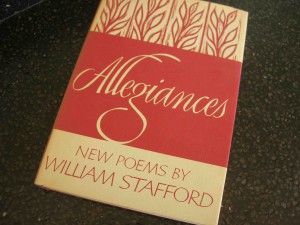Stafford Time

Dharma practitioners could well draw inspiration from the life and work of Oregon poet William Stafford.
The Buddhadharma has no monopoly on truth. This weekend Oregonians are celebrating the life and work of poet and pacifist William Stafford. Born on January 17, 100 years ago (on the eve of the War to End All Wars), Stafford exemplified the Shambhala values of gentleness, fearlessness, and wisdom, as an artist, teacher, and person.
Stafford was a conscientious objector during WWII and nearly lost his life because of it. He moved to Oregon in 1948 to teach at Lewis and Clark College and made his literary mark in 1963 with Traveling Through the Dark, which won the National Book Award for Poetry. Over the decades Stafford became dear to the people of Portland, especially its writers, for his openheartedness and the truth, wisdom, and accessibility of his writing.
I never met Stafford, but among writers his habits, view, and unconventional teaching style are legendary. Stafford rose early every day to write, alone in the dark, and created 22,000 poems this way over his lifetime. As a teacher he eschewed grades and held off from judging his students’ work. Instead, he described aspects of their writing, its characteristics, his reactions to it. When pressed about quality, he turned the question around, asking “What do YOU think?” Stafford had an amazing ability to listen to people — to be present and open with others. My mother took a class from him in the ’50s and remembers his unfailing kindness.
As a practitioner, I struggle to apply the dharma in real life, during this age, and often look to others for inspiration. How have they managed? What choices do they make? William Stafford is one of the people I see. Although I’m not aware of Stafford studying the dharma, somehow it seems to have seeped into him. I draw courage from his example — of how he was with others, and how completely open he was to his experience in creating poetry. Do we not all need living examples like this?
To read Stafford’s poetry or learn more about him and the special events occurring this weekend and throughout the month, point your browser to www.williamstafford.org or OPB’s archived Think Out Loud show on the Stafford centennial. Go ahead: Be inspired!
One thought on “Stafford Time”
Leave a Reply
You must be logged in to post a comment.








Here’s a short piece from the Friends of Wm Stafford Newsletter that I have read at the Center recently. “Steadfast waveriness” sounds pretty buddhist to me.
-=-=-=-=-=-=
Wm. Stafford to Kenny Johnson, Aug. 6th, 1970
One night at our house you posed a tough question for me. You took a stand that said one should accept his nature or preferences or principles, and do his thinking in terms of some kind of stand or commitment. I had always had lurking in my mind the idea that in my thinking I should try to erase my self–be ready to follow any thinking, including other people’s, and not have any commitment at all, if possible.
Down at Haystack 70 we had a discussion about such an issue, and
I realized your posing of the issue had lurked along in my thinking. Somewhere out on the edge of my stance, my way of seeing the world and myself: there is an allegiance that is almost like religion, maybe much like religion: it is the acceptance of one extreme belief-belief in the imminance [sic] of the world as provider of guidance for creatures with sense (sensibility). Experience will bring us more than we now have. Hence, I must be variable, not principled (except for this one principle of steadfast waveriness).